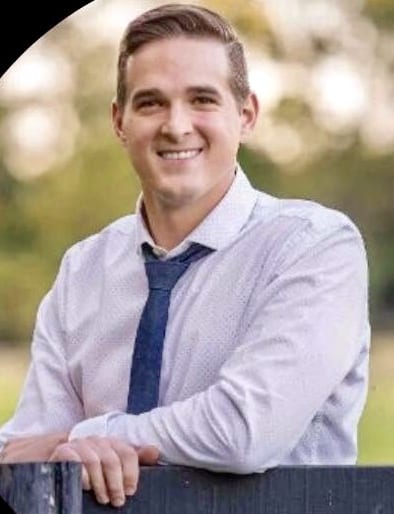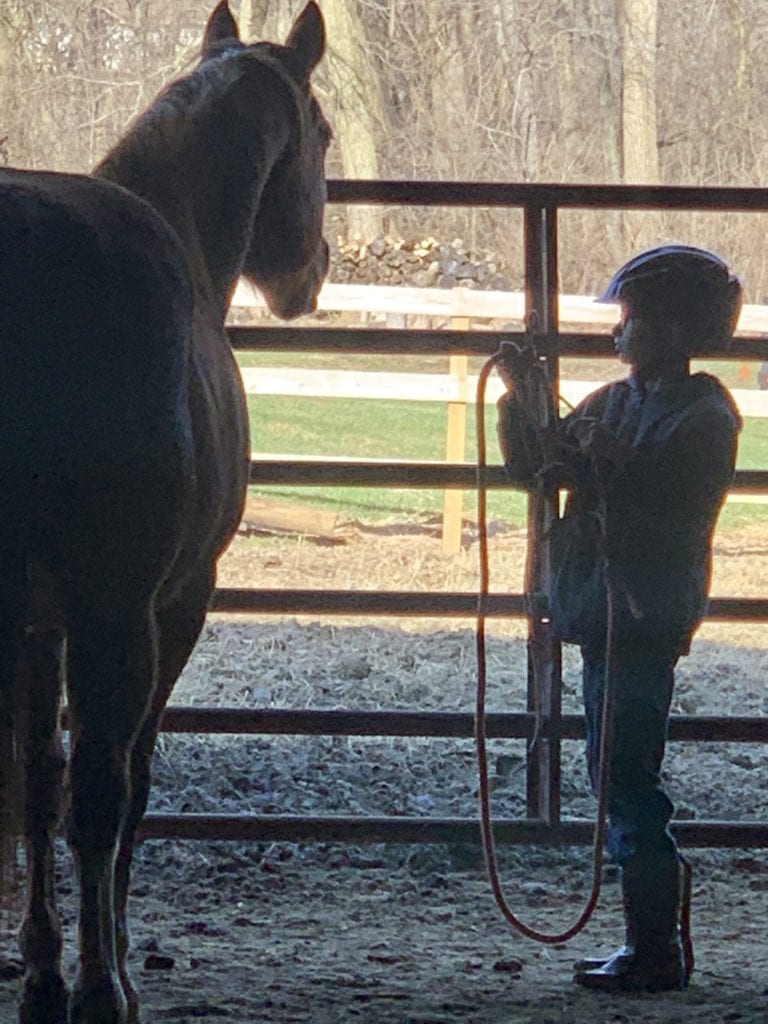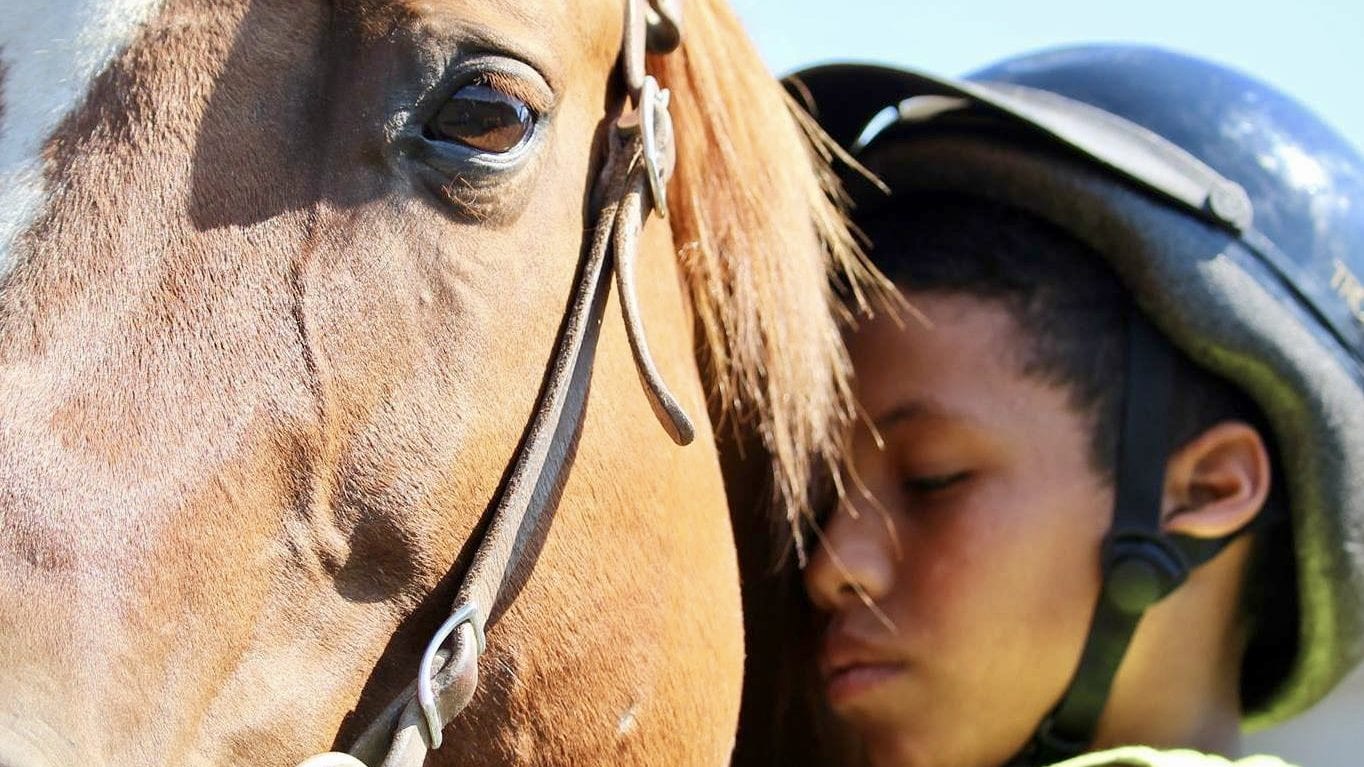Most people who have worked with horses in any capacity can agree that horses are, at least in some way, therapeutic. Sometimes, just walking into the barn, taking a deep breath filled with the smell of hay and shavings, and listening to the sound of happy horses munching away is enough to forget about your day – even just for a moment.
We have all felt the stress melt away as we tack up and run our hands across the soft fur of an animal so much larger than ourselves. There is no doubt that, whether we realize it or not, being around horses can be very therapeutic. However, not many people understand that there is a science behind these gentle animals calming our worries and making us feel comfortable and confident.
Michael Remole, father of twin boys and a veteran in the horse show community, has been working on this science for many years. Michael spent many years working with stock horses and showing on the AQHA circuit. Michael has nearly two decades of working with children and families in a variety of settings, including as a Children’s Pastor, Camp Counselor, and speaker, VBS Director, Multi-Systemic Therapist and as a clinician.
Remole was the first male to graduate from Olivet Nazarene University with a degree in children’s ministry. After serving as a Children’s pastor, he went on to obtain his Master of Arts in Clinical Counseling from Ashland Theological Seminary. While finishing up his counseling degree, Michael worked with his parents, Stan and Mary Remole, with the startup of Hooves of Hope.
 Following seminary, Michael (pictured right) worked in Columbus Ohio as a Multi-Systemic Therapist at The Buckeye Ranch, working with individuals 12-18 and their families. A majority of these youth were court ordered and were given one more chance before being placed in a residential treatment facility or long-term juvenile jail.
Following seminary, Michael (pictured right) worked in Columbus Ohio as a Multi-Systemic Therapist at The Buckeye Ranch, working with individuals 12-18 and their families. A majority of these youth were court ordered and were given one more chance before being placed in a residential treatment facility or long-term juvenile jail.
The primary focus was to help change the family system to help assist the child change their delinquent and defiant behaviors. Beginning in 2014, Remole became the proud owner of Gateway Family Services, an organization located in Potomac, Illinois. For a point of reference that is familiar to the horse show community, Potomac is located just east of Gordyville in Gifford and Michael is always open to visitors.
With a focus on trauma patients, Michael has a farm with ten horses that he uses for therapy work every day. Remole’s work in equine is unlike most. His work has allowed him to develop an understanding of how the human brain and the horse brain is strikingly similar.
In a basic explanation, what he has found is that there are two parts to both the human and the horse brain: upper and lower. The lower part of the brain, including the brain stem, has a solid fight or flight response when someone has experienced trauma. One of the ways they have found to cope with this is “rhythmic pattern repetitive movement”… that’s where the horses come in.
By using the horse’s movements, they can mimic the rhythm which the brain requires to find healthy pathways for the neurons to travel on, lessening this intense fight or flight response and helping the patient develop healthy coping mechanisms. Michael’s program goes beyond regular counseling and helps patients from the inside out.
There were so many amazing stories that Michael shared with GoHorseShow during his interview, but among the most compelling was about a little girl who had just recently lost her mother in a freak accident. Her caretakers believed that this form of therapy might help her learn to deal with grief and gain some confidence during this difficult time.
 Remole often lets his therapy patients choose the horse they want to work with (under the close eye of Michael making sure the horse is a fit). When she walked into the field to choose a horse, one specific horse walked up to her right away. What was so special about this is that the horse was orphaned as a baby and had been through several homes sure to being “difficult,” before landing at Gateway Family Services.
Remole often lets his therapy patients choose the horse they want to work with (under the close eye of Michael making sure the horse is a fit). When she walked into the field to choose a horse, one specific horse walked up to her right away. What was so special about this is that the horse was orphaned as a baby and had been through several homes sure to being “difficult,” before landing at Gateway Family Services.
Remole believes that the horse sensed the little girl’s pain and wanted to show her it was okay. The little girl even said, “I think my mommy sent me this horse to tell me it will be okay.” This form of therapy isn’t just fantastic for human patients; it’s suitable for the horses as well.
We asked Michael if he worked with other types of patients and he explained that he had seen natural lifesmanship work on patients of all ages with all kinds of struggles. He has seen particularly incredible success in people with ADHD. He finds that putting an easily distracted horse with an energetic and easily distracted child (though it sounds contradicting) can be incredibly beneficial. When the child is working with the horse, they are forced to focus on keeping that horse engaged in whatever task they are supposed to be completing. It’s incredible how these animals can target parts of our brains that very few exercises and practices can effectively help.
We already knew that horses are undeniably stress relieving (well, most of the time), but it is comforting to a lot of people to learn that this is normal and that there is a lot of science to back this up. It’s more than just the idea of working with something so powerful, yet so gentle at the same time.
It’s more than just something to get your muscles going and get those endorphins pumping. It’s more than just having a mane to rest your head on when you feel like there aren’t isn’t a human willing to listen. There is a real science behind your love and affection for the way these incredible animals make you feel.
Gateway Family Services is hosting a “barn bash” party to raise awareness for their services at Gordyville in July and invite you all to join them and get familiar with their amazing work!








